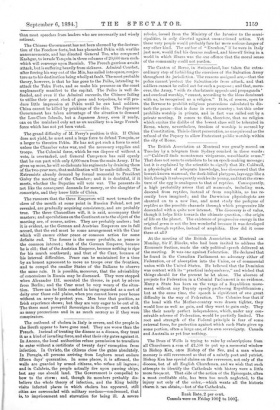At the meeting of the British Association at Montreal on
Monday, Sir F. Hincke, who had been invited to address the Economic Section, made the only political speech delivered at the meeting. It was one against Federation. He declared that he found in the Canadian Parliament no advocacy either of Federation, or of absorption into the Union, or of commercial union with the United States. He believed that the Dominion was content with its "practical independence," and wished that things should for the present be let alone. The absence of projects for Federation in a Colonial Parliament is no evidence. Many a State has been on the verge of a Republican move- ment without any Deputy openly professing Republicanism ; but at the same time, the speech is significant of one great difficulty in the way of Federation. The Colonies fear that if the bond with the Mother-country were drawn tighter, they would lose as well as gain, and they want to gain only. They like their nearly perfect independence, which, under any con- ceivable scheme of Federation, would be paitially limited. The root and strength of the Federal principle is fear of some external force, for protection against which each State gives up some portion, often a large one, of its own sovereignty. Canada and Australia as yet fear nothing.


































 Previous page
Previous page